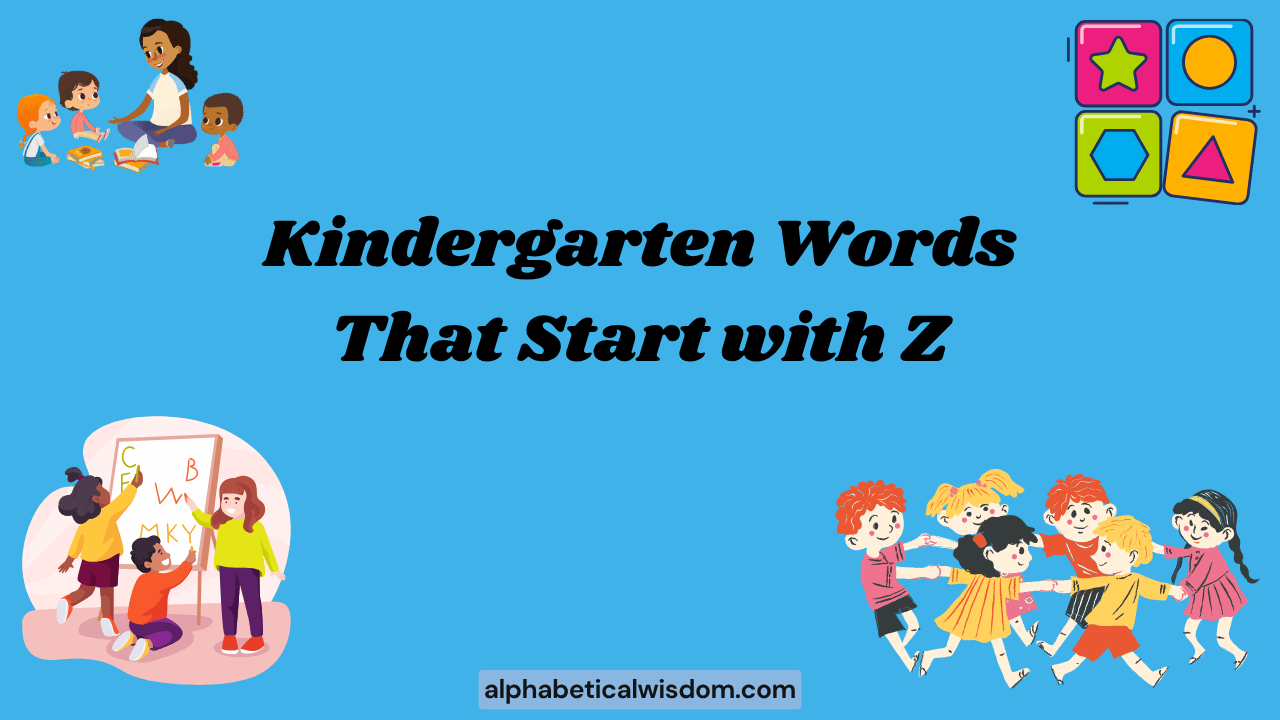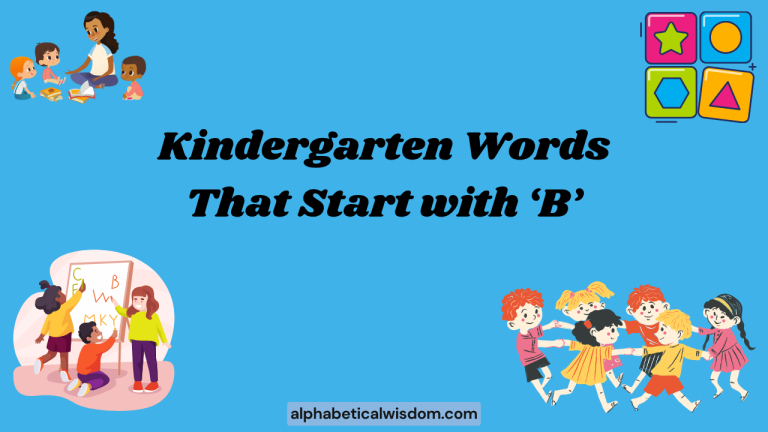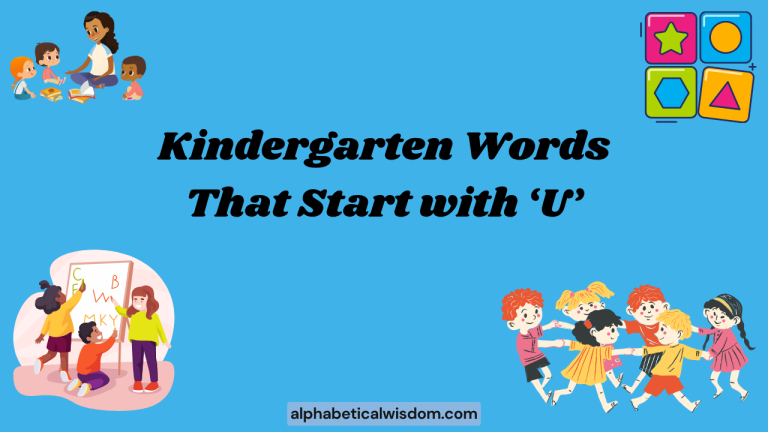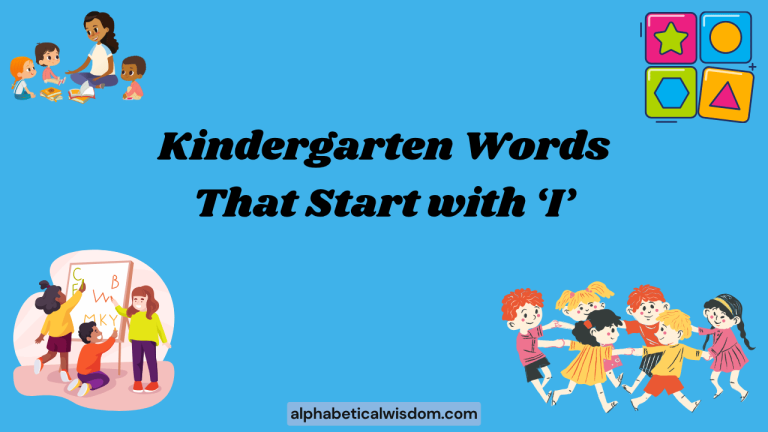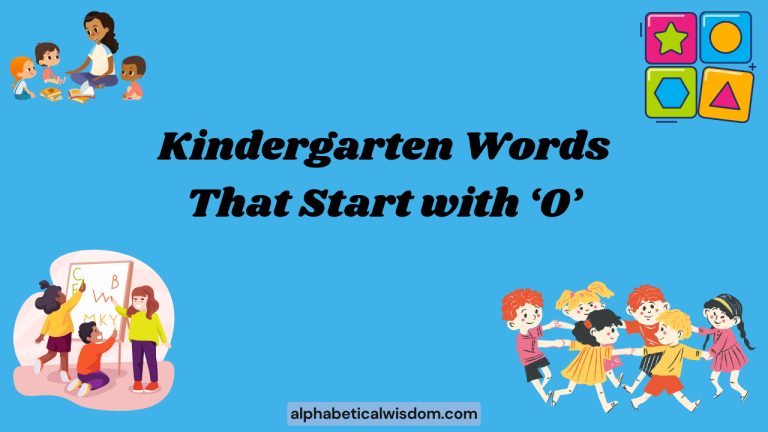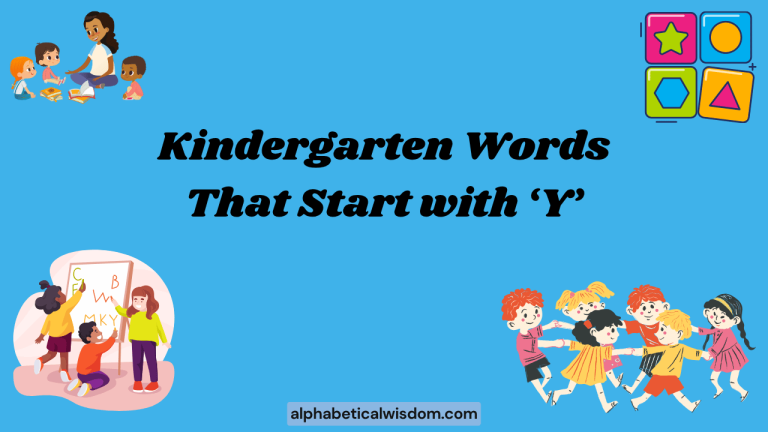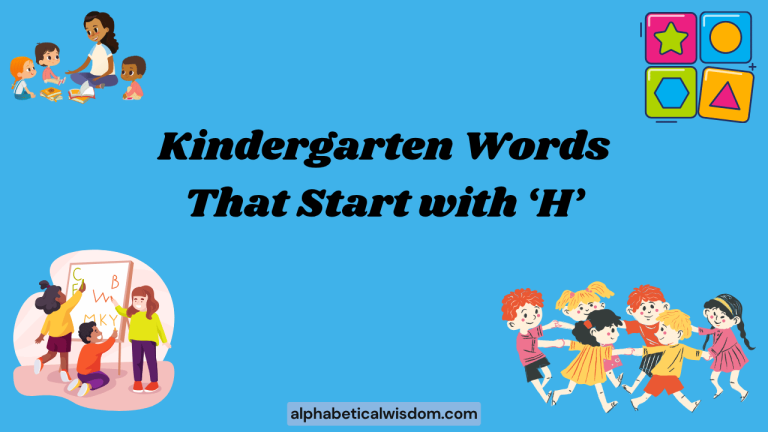Kindergarten Words That Start With Z: A Comprehensive Guide
Introducing young learners to the alphabet is a crucial step in their literacy journey. Focusing on words that start with the letter ‘Z’ can be both fun and educational.
While ‘Z’ words might be less common, they offer a unique opportunity to expand a child’s vocabulary and phonetic awareness. This guide is designed to provide a comprehensive overview of ‘Z’ words suitable for kindergarteners, helping educators and parents foster a strong foundation in language skills.
Understanding these words enhances early reading and writing abilities, setting children up for future academic success.
Table of Contents
- Introduction
- Definition of Kindergarten Words Starting with Z
- Structural Breakdown of Z Words
- Types or Categories of Z Words for Kindergarten
- Examples of Kindergarten Words That Start With Z
- Usage Rules for Z Words in Sentences
- Common Mistakes When Using Z Words
- Practice Exercises
- Advanced Topics Related to Z Words
- FAQ: Frequently Asked Questions
- Conclusion
Definition of Kindergarten Words Starting with Z
Kindergarten words that start with ‘Z’ are simple, age-appropriate terms designed to introduce young children to the phonetic sound and letter recognition of ‘Z’. These words are typically nouns, adjectives, or verbs that are easily understood and relatable to a kindergartner’s everyday experiences.
The primary function of teaching these words is to broaden vocabulary, improve pronunciation, and build a strong foundation for early literacy skills.
These words often serve as building blocks for sentence construction and storytelling. Contextually, they are used in various settings, from classroom activities to storybooks and everyday conversations.
Understanding ‘Z’ words also helps children grasp the concept that letters represent sounds, which is crucial for decoding and encoding written language.
Structural Breakdown of Z Words
The structural breakdown of ‘Z’ words involves understanding the phonetic sound of the letter ‘Z’ and how it combines with other letters to form words. Most ‘Z’ words follow simple phonetic patterns, making them easier for kindergarteners to learn and pronounce.
Often, the ‘Z’ sound is a voiced alveolar fricative, meaning it’s produced by vibrating the vocal cords and forcing air through a narrow channel at the alveolar ridge (the part of the mouth just behind the upper teeth).
A typical ‘Z’ word structure includes the letter ‘Z’ at the beginning, followed by a vowel and potentially a consonant. For example, in the word “zoo,” ‘Z’ is followed by the vowel ‘o’.
Understanding this basic structure helps children predict and recognize new ‘Z’ words more easily. Furthermore, recognizing common letter combinations can aid in spelling and reading comprehension.
Types or Categories of Z Words for Kindergarten
Nouns
Nouns are words that represent people, places, things, or ideas. ‘Z’ nouns for kindergarteners are often concrete objects or animals.
Adjectives
Adjectives are words that describe nouns. ‘Z’ adjectives add descriptive detail to sentences, making them more vivid and engaging.
Verbs
Verbs are words that describe actions or states of being. While less common, ‘Z’ verbs can be introduced to expand vocabulary.
Examples of Kindergarten Words That Start With Z
Examples of ‘Z’ Nouns
The following table provides examples of nouns that start with the letter ‘Z’, suitable for kindergarten students. These words are simple, commonly used, and easily relatable to their everyday experiences.
| Word | Definition | Example Sentence |
|---|---|---|
| Zoo | A place where animals are kept for public display. | We went to the zoo to see the lions. |
| Zebra | An African wild horse with black and white stripes. | The zebra has black and white stripes. |
| Zero | The number 0; nothing. | Zero is less than one. |
| Zip | A fastener used to close clothing or bags. | I can close my jacket with the zip. |
| Zinnia | A brightly colored flower. | The garden is full of zinnia flowers. |
| Zucchini | A green vegetable similar to a cucumber. | We grew zucchini in our garden. |
| Zigzag | A line that angles from side to side. | The road had a zigzag pattern. |
| Zone | An area or region with a particular feature or purpose. | This is a quiet zone for reading. |
| Zoom | The act of quickly increasing in size or speed. | The car went by in a zoom. |
| Zest | Enthusiasm or excitement. | He tackled the project with zest. |
| Zeal | Great energy or enthusiasm in pursuit of a cause or objective. | She approached her studies with great zeal. |
| Zenith | The highest point reached by a celestial or other object. | The sun reached its zenith at noon. |
| Zephyr | A soft gentle breeze. | A gentle zephyr rustled the leaves. |
| Zing | A quality of energy, enthusiasm, or excitement. | The lemon added a zing to the drink. |
| Zit | A small inflamed spot on the skin. | He had a zit on his nose. |
| Zombie | A lifeless person believed to have been brought back to life. | The movie featured scary zombies. |
| Zoster | Another name for shingles. | My grandfather had zoster last year. |
| Zloty | The basic monetary unit of Poland. | He exchanged his dollars for zloty. |
| Zouk | A type of fast rhythmic dance music originating from the Caribbean islands of Guadeloupe and Martinique. | They danced to the lively rhythm of zouk music. |
| Ziggurat | A rectangular stepped tower, sometimes surmounted by a temple. | The ancient ziggurat stood tall in the city. |
| Zinfandel | A black-skinned wine grape of Croatian origin. | We enjoyed a glass of Zinfandel with dinner. |
| Zillion | An extremely large, indeterminate number. | There are a zillion stars in the sky. |
| Zircon | A mineral occurring as prismatic crystals. | The ring was adorned with a sparkling zircon. |
Examples of ‘Z’ Adjectives
Here are examples of adjectives starting with ‘Z’ that can be used to describe nouns, enriching the vocabulary of kindergarten learners.
| Word | Definition | Example Sentence |
|---|---|---|
| Zany | Funny in a slightly crazy way. | The clown was very zany. |
| Zealous | Full of energy, enthusiasm, and intensity. | She was zealous about her new job. |
| Zippy | Lively and fast-moving. | The zippy car sped down the road. |
| Zonked | Extremely tired or exhausted. | After the long day, I felt completely zonked. |
| Zero | Being at the lowest point. | The temperature dropped to zero degrees. |
| Zincy | Relating to or containing zinc. | The medicine had a slightly zincy taste. |
| Zestful | Full of energy and enthusiasm. | She lived a zestful life, always ready for adventure. |
| Zigzag | Having sharp, alternating turns. | The zigzag path led up the steep hill. |
| Zillionth | Denoting an extremely large, indeterminate number. | He felt like the zillionth person to ask the same question. |
Examples of ‘Z’ Verbs
While ‘Z’ verbs are less common, they can still be introduced to kindergarteners to illustrate actions. These examples are simplified for easy understanding.
| Word | Definition | Example Sentence |
|---|---|---|
| Zoom | To move quickly. | The car can zoom very fast. |
| Zip | To fasten with a zipper. | I can zip my jacket by myself. |
| Zero | To adjust (an instrument) to read zero. | We need to zero the scale before weighing. |
| Zone | To divide or designate an area for a specific purpose | The city decided to zone the area for residential use. |
| Zigzag | To move along a zigzag path. | The skier zigzagged down the slope. |
| Zest | To scrape off the outer colored part of citrus fruit for flavoring. | She zested a lemon for the cake recipe. |
Additional ‘Z’ Words for Kindergarten
Expanding the vocabulary further can include these less common but still accessible words.
| Word | Category | Definition | Example Sentence |
|---|---|---|---|
| Zoomorphism | Noun | The representation of gods or humans with animal characteristics. | The ancient art often featured zoomorphism. |
| Zygote | Noun | A diploid cell resulting from the fusion of two haploid gametes; a fertilized ovum. | The zygote develops into an embryo. |
| Zirconium | Noun | The chemical element of atomic number 40, a strong gray metal resembling titanium. | Zirconium is used in various industrial applications. |
| Zoology | Noun | The scientific study of the behavior, physiology, structure, classification, and distribution of animals. | She is studying zoology at the university. |
| Zooplankton | Noun | Plankton consisting of small animals and immature stages of larger animals. | Zooplankton are an important part of the marine food chain. |
Usage Rules for Z Words in Sentences
When using ‘Z’ words in sentences, it’s important to follow basic grammar rules. Nouns should agree in number with verbs, and adjectives should correctly describe nouns.
The placement of ‘Z’ words within a sentence also matters for clarity and meaning.
For example, “The zebra is black and white” is grammatically correct because the singular noun “zebra” agrees with the singular verb “is.” Similarly, “The zany clown made us laugh” uses the adjective “zany” correctly to describe the noun “clown.” Proper sentence structure ensures that the message is conveyed effectively and without confusion.
Common Mistakes When Using Z Words
One common mistake is mispronouncing ‘Z’ words, especially if the child’s first language has a different phonetic sound for ‘Z’. Another common error is confusing ‘Z’ words with similar-sounding words that start with other letters.
Spelling mistakes are also frequent, especially with less common ‘Z’ words.
Incorrect: “The Sebra is in the zoo.” Correct: “The zebra is in the zoo.”
Incorrect: “I want to sipper my jacket.” Correct: “I want to zip my jacket.”
Incorrect: “The clowm was zany.” Correct: “The clown was zany.”
Practice Exercises
Exercise 1: Fill in the Blanks
Complete the following sentences with appropriate ‘Z’ words.
| Question | Answer |
|---|---|
| 1. We saw a _________ at the zoo. | zebra |
| 2. The car can _________ down the road. | zoom |
| 3. My jacket has a _________. | zip |
| 4. _________ is less than one. | Zero |
| 5. The path had a _________ pattern. | zigzag |
| 6. The _________ clown made everyone laugh. | zany |
| 7. She felt so __________ after the long trip that she fell straight asleep. | zonked |
| 8. He showed great _________ in his pursuit of the championship, practicing tirelessly every day. | zeal |
| 9. The chef added lemon _________ to the cake batter for a refreshing citrus flavor. | zest |
| 10. The scientist studied different types of _________ in the ocean during her research expedition. | zooplankton |
Exercise 2: Word Matching
Match the ‘Z’ word with its correct definition.
| Word | Definition |
|---|---|
| 1. Zoo | (d) A place where animals are kept |
| 2. Zebra | (a) An African wild horse with stripes |
| 3. Zip | (b) A fastener for clothing |
| 4. Zero | (c) The number 0 |
Definitions:
- An African wild horse with stripes
- A fastener for clothing
- The number 0
- A place where animals are kept
Exercise 3: Sentence Construction
Create a sentence using each of the following ‘Z’ words.
| Word | Sentence |
|---|---|
| 1. Zoo | We visited the zoo on Saturday. |
| 2. Zebra | The zebra grazed peacefully in the field. |
| 3. Zip | Can you help me zip up my coat? |
| 4. Zero | The temperature dropped to zero last night. |
| 5. Zany | The zany antics of the clown made the children laugh. |
| 6. Zoom | The race car will zoom around the track. |
| 7. Zest | She tackled the new project with zest and determination. |
| 8. Zigzag | The river followed a zigzag path through the valley. |
| 9. Zone | This area is a quiet zone for studying. |
| 10. Zeal | His zeal for learning was truly inspiring. |
Advanced Topics Related to Z Words
For advanced learners, exploring the etymology of ‘Z’ words can be insightful. Understanding where these words come from and how they evolved can deepen their appreciation for language.
Additionally, exploring ‘Z’ words in different contexts, such as literature or science, can expand their understanding of the word’s nuances.
For instance, the word “zombie” has roots in Haitian folklore, while “zephyr” comes from Greek mythology, representing the west wind. Delving into these backgrounds provides a richer, more comprehensive understanding of language and culture.
FAQ: Frequently Asked Questions
- Why is it important to teach ‘Z’ words to kindergarteners?
Teaching ‘Z’ words helps expand vocabulary, improve pronunciation, and build a strong foundation for early literacy skills. It also helps children understand that letters represent sounds.
- What are some common ‘Z’ words for kindergarteners?
Common words include zoo, zebra, zero, zip, and zinnia. These words are simple, relatable, and easy to pronounce.
- How can I make learning ‘Z’ words fun for kids?
Use games, flashcards, and interactive activities to make learning enjoyable. Incorporate ‘Z’ words into storytelling and everyday conversations.
- What if a child struggles to pronounce ‘Z’ words?
Practice the phonetic sound of ‘Z’ repeatedly. Use visual aids and encourage the child to mimic your pronunciation. Be patient and provide positive reinforcement.
- Are there any books that focus on ‘Z’ words?
Yes, many alphabet books feature ‘Z’ words. Look for books with colorful illustrations and simple sentences to keep children engaged.
- How can I incorporate ‘Z’ words into daily activities?
Point out ‘Z’ words in everyday life, such as when visiting the zoo or using a zipper. Encourage children to use ‘Z’ words in their drawings and stories.
- What are some advanced ‘Z’ words for older kids?
Advanced words include zenith, zephyr, zealous, and zoology. These words can challenge older children and further expand their vocabulary.
- How can I assess a child’s understanding of ‘Z’ words?
Use simple quizzes, word matching games, and sentence construction exercises to assess comprehension. Observe their ability to use ‘Z’ words in conversations and writing.
- What is the origin of the letter ‘Z’?
The letter ‘Z’ comes from the Greek letter “zeta,” which in turn originated from the Phoenician letter “zayin.” These ancient forms eventually evolved into the modern letter ‘Z’ we use today.
- Are there any idioms or expressions that use the letter ‘Z’?
While less common than other letters, one example is “catch some Z’s,” which means to get some sleep. This idiom is often used informally.
- How does the pronunciation of ‘Z’ vary in different languages?
The pronunciation of ‘Z’ can vary significantly. In English, it’s typically pronounced as a voiced alveolar fricative (/z/). However, in some languages like German, it can be pronounced as /ts/ (like in “pizza”). In Spanish, it can be pronounced as /θ/ (like “th” in “thin”) in certain regions.
- What are some strategies to help children differentiate the ‘Z’ sound from similar sounds like ‘S’?
Focus on the voicing: the ‘Z’ sound involves vibration of the vocal cords, while ‘S’ does not. Use tactile methods, such as having children place their hand on their throat to feel the vibration when saying ‘Z’. Practice minimal pairs (words that differ only by one sound) like “zoo” and “sue” to highlight the difference.
Conclusion
Mastering kindergarten words that start with the letter ‘Z’ is a valuable step in a child’s early literacy development. By understanding the definitions, usage rules, and common mistakes associated with these words, educators and parents can effectively support young learners.
Engaging activities, practice exercises, and a focus on phonetic awareness can make the learning process both enjoyable and successful.
Remember to be patient and provide positive reinforcement as children explore the world of ‘Z’ words. Encourage them to use these words in their everyday conversations and creative writing.
With consistent practice and a supportive learning environment, kindergarteners can build a strong foundation in language skills and develop a lifelong love of reading and writing. Keep exploring and discovering new words together!
